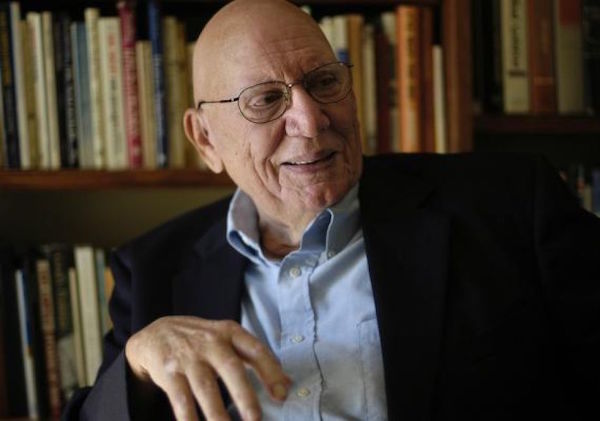John F. Kennedy had emerged as the young and charismatic candidate for the Democratic Party in the 1960 presidential race. Early detractors in his own party, including former President Harry S. Truman, had tried to use that youth against him. But in the fall of 1960 it was his Catholic faith which threatened to block his path to the White House. The prompt action by a former Marine Corps sergeant effectively cleared the path.
Sergeant Herbert Meza had been a squad leader in Fox Company, 2nd Battalion, 23rd Marines, of the 4th Marine Division ("2-F-23") in WWII, until being shot and evacuated from Saipan in 1944. Sixteen years later, Meza was a Presbyterian Minister and a member of the Greater Houston Ministerial Association. Asked if he would take over as Program Director he agreed on the condition that he would have the final word on the programs he chose.
"They elected me Vice President," explained Meza, "which was also Program Chairman, so I had carte blanche. So the first person I invited was John Kennedy."
Meza was frustrated over the campaign by an ad hoc national group of prominent Protestants, including Norman Vincent Peale, to block Kennedy’s election solely on the basis of his Catholic faith. The argument was whether a devout Catholic President might be compelled to answer to the Pope over the Constitution. Believing that there should be no such litmus test for a public election, Pastor Meza invited Kennedy to come to Houston and address the issue directly, before the Houston Ministerial Association. He sent the invitation through an area friend, Judge Woodrow Shields, himself a Army Air Force pilot in the European Theater during the war, and an active Methodist and Democrat.
"They got the invitation from me while they were in West Virginia," recalled Meza in 2015. "Then they moved from there to California. And when they got to California they had a pow wow out there, and they recognized from the West Virginia campaign that the religious issue was the issue. So they wired me back and let me know that they would accept an invitation. Then, in order to try to be fair, I also invited Richard Nixon.”
Requests for passes to the 12 September event poured in from clergy and Press from across the nation. Meza replied that it was first-come, first-served. As it quickly became apparent that the event was not going to fit into a church, he reached out again to Shields, who arranged for the event to be held in the peach and pink Crystal Ballroom at Houston’s historic Rice Hotel. Two weeks ahead of the event, Kennedy’s liaison, James W. Wine, visited with Meza and asked only that the event be fair. Meza assured him that its very purpose was for that reason, and that it would be.
 Herb Meza by Photojournalist Debbi Morello. DebbiMorello.com
Herb Meza by Photojournalist Debbi Morello. DebbiMorello.com
The day before the meeting, Wine came to Meza again. “He said, ‘We’ve got a problem,’” recalled Meza. “I said, ‘what’s that?’ He said, ‘LBJ wants to introduce him.’ I said, ‘He can’t do that. This is a religious meeting, a meeting of the Houston Ministerial Association.’ And Jim Wine said to me, ‘Well, I’ll relay the message but they tell me LBJ is pretty stiff at this.’ So the morning of the meeting he came back and said, ‘LBJ says, ‘’No damn little preacher is going to tell him what to do in Texas.’ And I said, ‘Well you tell LBJ that if he climbs up on this platform, I’ll climb down, and he’ll find himself moderating a meeting of the Houston Ministerial Association.’ I think they kept him upstairs watching on closed circuit TV.”
The Crystal Ballroom was filled to capacity of some 400, with Meza and Kennedy sitting together at an on-stage table. The crowd was restless.
“When we got on the platform and shook hands and he sat next to me,” recalled Meza. “He had his hands on his knees and they were shaking. I could see them shaking!”
Microphones had been placed at the front of the three aisles so that attendees could approach in line and ask questions in turn. The old Marine sergeant made clear the ground rules. “I said I would go from left to right, in order. And I said, ‘Fair questions. If you’re going to make a statement, I’ll cut you off.’ And I did. I cut off a couple of people. But it went pretty well.”
Meza introduced Kennedy, who stepped to the podium and, to Meza’s eye, seemed immediately relaxed. He delivered an eleven-minute speech on politics and religion that was broadcast repeatedly across the country over the weeks to come. Then he opened the session to questions. One after another, the attendees stood to direct pointed questions at the Catholic candidate. Kennedy answered them with steadfast calm, asserting that he was not a Catholic candidate but a Democratic candidate for President of the United States, and that Rome would have no influence in the Oval Office.
"I could see them shaking!"
“Jack Kennedy was superb,” said Meza. “His answers were clear, honest, articulate. And when he was through, that whole audience gave him a standing ovation.”
The daunting national controversy that had stood in the way of Kennedy’s presidency was swept away.
In Lubbock, Texas, former Gunnery Sergeant Harold Douglas was a CPA. He had served in 2-F-23 with Meza, and watched the historic occasion in the news closely. “I was very interested in that whole situation, and I remember that meeting happening in Houston very well," said Douglas. "And that was the end of it all. It just quieted the whole thing. But I never knew who was at the center of that event, or that it was one of our Fox Company guys.”
LBJ, meanwhile, was apparently upstairs in his room. But Meza had been told that LBJ never forgot a slight.
Three years later President John F. Kennedy and his wife again visited Texas, and Reverend Herb Meza was one who greeted him as he stepped off the plane. “Ten of us were invited to greet him. When JFK came by he said, ‘Reverend, we remember the meeting last time.’ I said, ‘Yes, it went pretty well, didn’t it?’ And he went by, and Jackie came by and said, ‘Are you Herb Meza?’ And when LBJ got to me, he turned around to talk to one of his employees and passed me by,” Meza recalled with a laugh. “He never greeted me.”
The next day, President and Mrs. Kennedy took their seats in the back of a 1963 Lincoln convertible to join a Presidential caravan through downtown Dallas."
-- Steven McCloud
Trident Leadership
Unit Historian/Honorary Member, 2-F-23
The full story of Meza's WWII rifle company Company has been written by Trident founder, Steven McCloud. Two decades and hundreds of interviews with the Marine veterans of that World War II rifle company, paired with forensic-level research had produced a journey across the Central Pacific with the Marines as never seen before.
The manuscript is now with a publisher, awaiting the word to go. Visit the website.
2F23Marines.com

